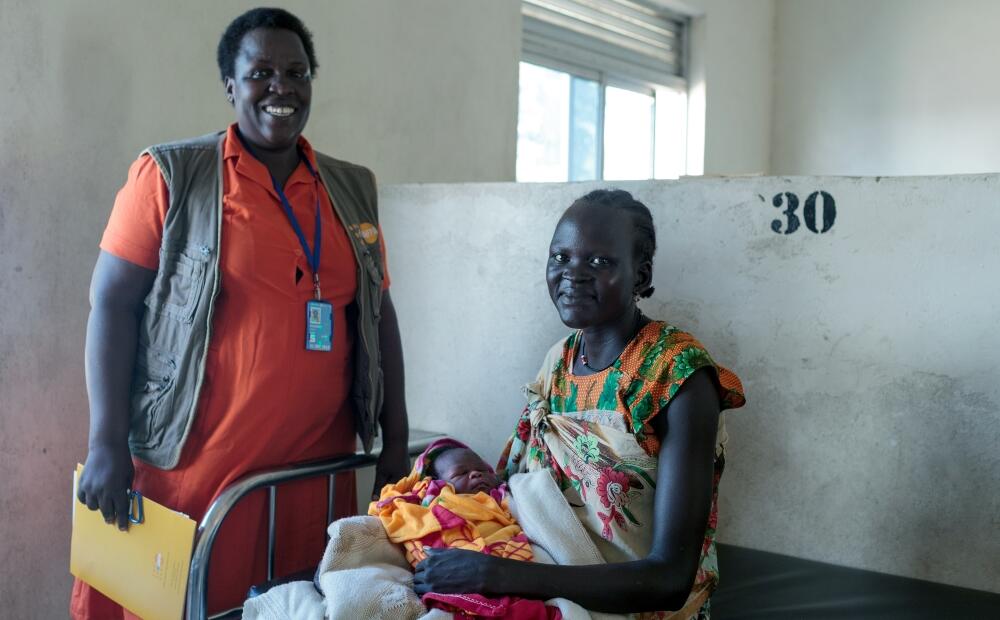With only eight midwives and the highest maternal death rate in the world at the time of independence in 2011, South Sudan has since made great strides in ensuring maternal health care is more accessible to women.
Today, the young nation has more than 700 midwives, thanks to a midwifery project initiated by UNFPA, the sexual and reproductive health agency, through the support of the governments of Canada and Sweden, and in partnership with the Ministry of Health.
The maternal mortality ratio in South Sudan has dropped from 2,054 deaths per 100,000 live births in 2006 (South Sudan Household Survey) to 789 per 100,000 in 2015 (estimate by World Bank and United Nations).
This good news was shared by UNFPA South Sudan Country Representative, Dr. Mary Otieno, at the Women Deliver 2019 Conference in Vancouver, Canada last week.
Through the midwifery project, we were able to reach around 2 million women and girls with a wide range of sexual and reproductive health services.

one-stop centres providing integrated medical,
psychosocial and legal services to survivors of
gender-based violence." - Dr. Mary Otieno,
UNFPA Representative for South Sudan, at the
Global Midwifery Symposium reception.
© Tonia Occhionero/CAM
“Through the midwifery project, we were able to reach around 2 million women and girls with a wide range of sexual and reproductive health services,” Dr. Otieno said at the pre-conference Global Midwifery Symposium.
The midwifery project also supports prevention of and response to gender-based violence (GBV). “Not only do we focus on maternal health but through the midwifery initiative, we launched one-stop centres providing integrated medical, psychosocial and legal services to survivors of GBV,” Dr. Otieno said.
In 2018, three centres supported by the midwifery project assisted 813 GBV survivors. Seventy-one cases have been taken to court, leading to 45 convictions so far.
The results encouraged other donors, such as Norway and Switzerland, to support the establishment of more centres, Dr. Otieno said. The overall target is to have at least one centre in every state.
At a panel discussion focused on South Sudan and the 25th anniversary of the International Conference on Population and Development (ICPD), Dr. Otieno said the life-saving sexual and reproductive health services of the midwifery project, such as safe deliveries and family planning, are at the very heart of the ICPD Agenda.
However, South Sudan has much to do to complete the unfinished business of the ICPD.
We have brought down maternal deaths but it remains high. We need more health professionals to work in the health sector. We also need to bring health services closer to or more accessible to the people.

skills in a simulated infant resuscitation at the EdTech Talk
session. © Maternity Foundation
“We have brought down maternal deaths but it remains high. We need more health professionals to work in the health sector and ensure sustained deployment and retention of health workers, especially doctors, midwives and nurses,” Dr. Otieno said.
“We also need to bring health services closer to or more accessible to the people. Less than 40 per cent of health facilities are functional to some degree. There is very limited access to health services in rural communities, so we need to rehabilitate the facilities and put in place a strong referral network so that women and girls have access to life-saving services when they need those.”
At the EdTech Talk, a side session on the use of technology and innovation for training and education, Dr. Otieno highlighted the challenges faced by the midwifery education in South Sudan, particularly on sustainability of skills upgrading and addressing weak infrastructure, such as electricity and internet connectivity. She also expressed optimism that opportunities for the use of apps in education could become a reality, with implementation of South Sudan’s revitalized peace agreement.
The achievements of the midwifery project shared at the Women Deliver Conference mean more than just the numbers, Dr. Otieno said. The numbers represent people whose lives have been saved or have changed in one way or another because of the services established through the midwifery project.
“The gains achieved, despite the challenges and difficulties, serve as motivation for UNFPA and partners to do more. We will work hand in hand to support South Sudan’s women and girls to realize their full potential,” she said.
- Arlene Alano


